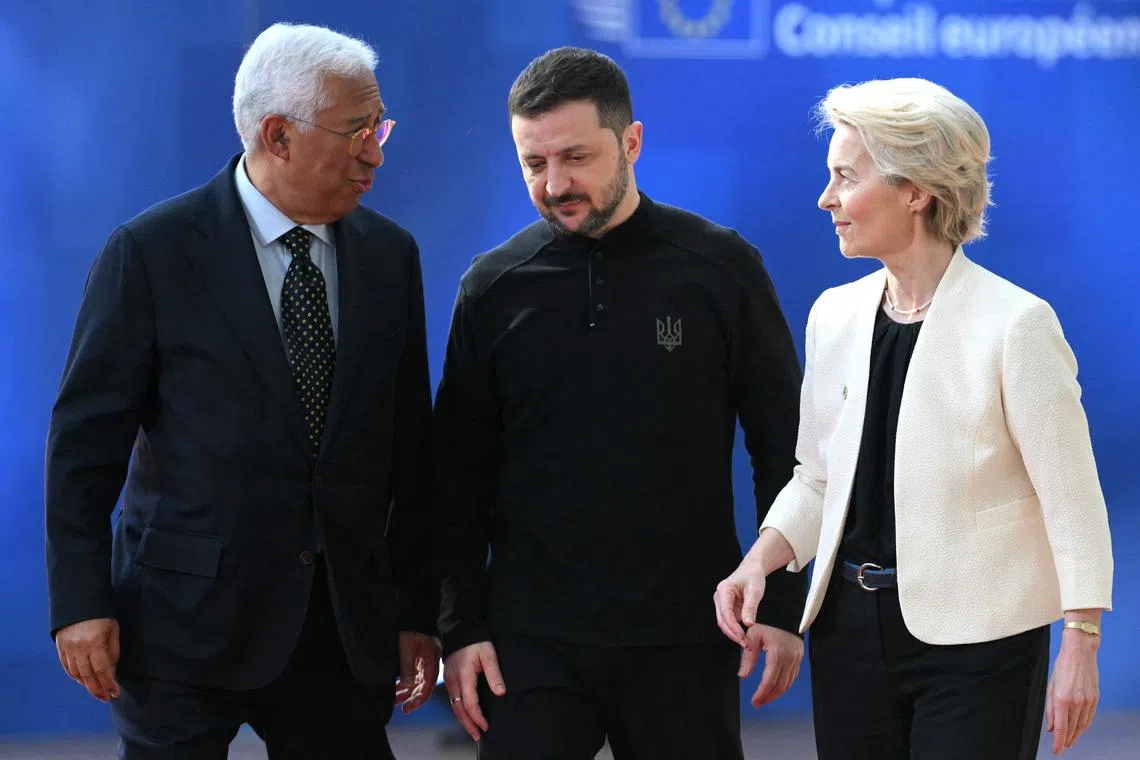News analysis
Europe talks big on defence spending, but the real amount could be much less
Sign up now: Get ST's newsletters delivered to your inbox

(From left) European Council president Antonio Costa, Ukrainian President Volodymyr Zelensky and European Commission president Ursula von der Leyen in Brussels on March 6.
PHOTO: AFP
BRUSSELS – All American presidents since John F. Kennedy have urged their European allies to spend more on their militaries and rely less on US military might.
But what Mr Kennedy and his successors failed to achieve during more than six decades, US President Donald Trump has now accomplished in under 60 days.
At a summit held in the Belgian capital Brussels
Facing the consequences of Russia’s full-scale invasion of Ukraine and deeply shaken by Mr Trump’s determination to conclude a separate US-Russia deal above their heads and without their consultation, the Europeans have finally stepped up to the plate by pledging vast sums of money to their militaries.
According to a plan dubbed “ReArm Europe” presented at the Brussels summit by European Commission president Ursula von der Leyen, her executive body alone will be responsible for “mobilising” around €800 billion (S$1.15 trillion) in extra spending for defence.
“Europe is ready to assume its responsibilities,” Dr von der Leyen said.
Individual European states – particularly Germany, the continent’s largest economy – have also come forward, vowing to spend almost as much again.
Yet, while the continent’s determination to rearm is not in question, serious doubts persist about the sums currently envisaged and the speed with which Europe could acquire new military capabilities.
The EU is used to crises; it was founded to tackle significant crises on the continent, and has usually emerged stronger from each trial. However, the current challenge is existential for a continent that has spent far too little on its militaries for far too long and has relied on the US security umbrella, despite indications during Mr Trump’s first presidency that he feels no obligation to uphold America’s historic commitments.
Recently, the US President humiliated Ukrainian President Volodymyr Zelensky during a meeting in the White House that culminated in a shouting match
And if this was not enough, the Trump administration also told the US intelligence community to stop offensive cyber operations against Russia,
Several officials and politicians close to Mr Trump even suggested the US could withdraw from Nato, the US-led military alliance in Europe.
European leaders no longer speculate whether the mood in Washington may change; they now accept that the US security guarantee is fading and the process is essentially unstoppable.
While French President Emmanuel Macron has spoken of the need for “an incredible awakening”, the worry in Brussels is that developments are moving at such a dizzying pace that Europe will always be playing catch-up in military capabilities, while the threat of Russia emerging relatively victorious from the Ukraine war looms ever larger.
Hence, vast sums of money are now pledged for defence spending. Still, the figures announced at the Brussels summit have been deliberately inflated.
Take, as an example, the €800 billion package announced by Dr von der Leyen. Only €150 billion of this grand sum is new money to be raised by the EU as a whole.
The rest is derived from the von der Leyen assumption that EU member states will now be free to ignore previous limits on how much they can borrow and may end up spending an extra €650 billion within the coming four years, by increasing their defence budgets by 1.5 per cent of their gross domestic product (GDP).
Yet, there is no evidence that any European state plans for such significant increases in spending; at least for the moment, national defence budgets are growing by only decimal fractions of 1 per cent of GDP. And in any case, telling a country that it is free to borrow is not the same as saying that the money is either now available or will be spent, as European leaders attending the summit appeared to imply.
The German pledge to spend more is equally impressive, yet potentially similarly hollow. The incoming government is offering to spend an additional €500 billion on its national military.
But this is all conditional on the government’s ability to amend the country’s existing legislation within the next two weeks, by using the majority in the outgoing German Parliament.
If this deadline is missed, the new Parliament elected in the recent general election and due to come into operation by the end of March will lack the necessary majority for such a move.
And even if the extra defence allocation is approved, it is planned to cover spending over the next 10 years, beyond the life of any current government, and assumes that Germany’s economy will grow in the years to come – both very brave assumptions.
There is no question that the Europeans are determined to boost their militaries. But no matter how hard they try, it will take them at least a decade to even begin replacing the military capabilities provided by the US.
Europe’s defence industries will need years to gear up for the increased production, and most of the continent’s defence ministries cannot manage such complex and vast weapon procurement projects.
So, although European leaders were keen to display their unity and determination in Brussels, they also continued to strive for the most amicable cooperation with the US, if only to win time.
“We must ensure, with a cool and intelligent head, that the support of the US is guaranteed,” said outgoing German Chancellor Olaf Scholz.
For good measure, the Europeans now plan to refine these measures at another summit in two weeks.
Nobody beats Europe on summitry.



